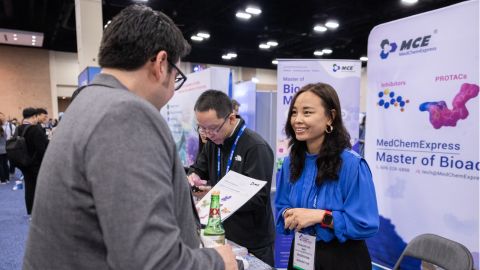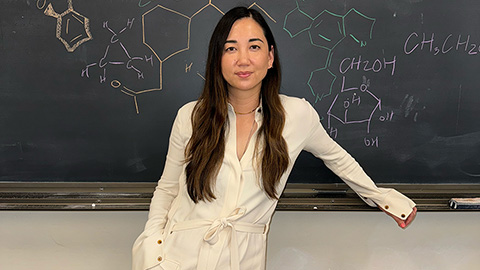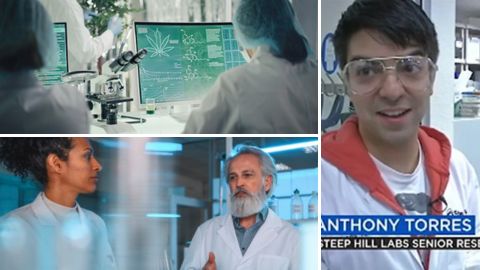‘A holistic view’
Heino Heyman loves to talk about metabolomics. He met up with ASBMB Today over a video conference to talk about how his path took him from hunting for natural products in Pretoria to helping users plan experiments near Walla Walla and now to metabolomics company Metabolon as a metabolomics application specialist. This interview has been condensed and edited.

Name: Heino Heyman
Current position: Field application specialist, Metabolon
Career path: Ph.D., University of Pretoria, medicinal plant science
Postdoctoral research: University of Johannesburg, Pacific Northwest National Lab
First job outside of academia: Application scientist, Bruker
Favorite molecule or protein: Tricaffeoylquinic acid will always be close to my heart. It was a major component of my Ph.D., and a lot of sweat and tears went in. They’ve now discovered how it fits into the integrase enzyme of HIV.
You’re an application specialist at Metabolon. What does that mean, exactly?
We sell metabolomics analysis as a service. When our sales team has a call to make a case to the customer, I’m usually on the call to give technical insights into our platform, how we run it, the limitations, the opportunities and so forth.
I’m usually on the beginning call, consulting and discussing the study design and sample amounts and everything like that. Then at the end, when the customer wants to engage with their data, I help them to understand how they can do this with our tools.
In my position, I can talk metabolomics every day. I engage with so many different people and I hear about all of these different projects that they’re working on, pushing science to the next level.
We work on clinical trials with small startup biotechs that want to go beyond the traditional biomarker analyses. We also have population health studies with epidemiologists who want to understand how the metabolite profile changes for a large cohort with a specific disease. Also, for bioprocessing plants, we can support the client with process engineering and really giving them a much broader view than what they are traditionally used to. Instead of looking at a handful of metabolites or compounds, we’re looking at maybe 500 to 1,000 metabolites and how they are changing constantly.
What skills do you need that you didn’t need in more academic settings?
In academia, you don’t necessarily think you have communication skills. But communicating and working in teams is something you do acquire early on. I think we underestimate, as postdoctoral Ph.D.s, how much communication we actually do.
Industry is very much about listening and understanding the question the customer has. As Ph.D.s, because we are the experts, we usually do the talking. With a sales approach, you can’t talk the whole time; you need to know what the customer wants. You need to listen and think on your feet; you have this repertoire of potential solutions for the customer, but how can they apply? You have this narrow window where you have to convince them that metabolomics can change how they have done things in the past and how it will add value to them. In an academic setting you are given plenty of time to go down a rabbit hole and explain your thinking, but in a commercial setting you have to get that message across very quickly.
COVID-19 has brought in challenges, of course. The tradition of going to a conference, having your colors out there at the booth and being able to engage people at that point has really been limited. We’re having more one-on-one meetings. I think the marketing need is so much higher now to be on all the different platforms and have a compelling hook. There are so many people putting information out there; you have to get people to take a look at your technology. I work very closely with the marketing team to understand the questions people are asking and what would potentially get their attention.
Looking back, what got you interested in metabolomics?
My first love in science was natural products, finding active ingredients within plants that can be used to treat diseases. I did my honors thesis, master’s and Ph.D. in that direction at the University of Pretoria. The process of natural product discovery is notorious for being very long, and my supervisor at that time started to look into metabolomics because we needed to speed up the time to get a product from basic research to clinical trials. We used metabolomics to look at quite a few different species of this one plant to find an active fingerprint, if you will, to then direct our isolation of that compound as quickly as possible. That really got me excited about metabolomics.
When I finished my Ph.D., my first postdoc took me then to crop biotechnology at the University of Johannesburg for one year. After that, I applied to go to Pacific Northwest National Lab and continue my second postdoc there.
As a postdoc at PNNL, you worked on a number of different studies. Does your current job feel similar?
That was actually my first exposure to many different types of metabolomics interests and projects. PNNL has a user facility; people from all over the world can apply for grants to run analysis, metabolomics, genomics, proteomics, etc. Being on those calls, I started to enjoy that client-collaborative environment. When my contract was up, I looked for an industry position where I could engage with customers on a daily basis.
I then went over to Bruker, which makes top-of-the-line mass spec instrumentation, as a metabolomics application scientist. I like the technology aspect. But at a certain point, I felt a little bit disconnected from the translational aspect of metabolomics.
My wife usually tells me I’m not the traditional scientist because I want to engage with people on a daily basis and I have this interest in business. I liked being in the lab. But I think now where I really get my energy is engaging with customers and getting them all excited about metabolomics — or when we have all of these data points and those aha moments appear.
What’s most exciting about metabolomics right now?
So metabolomics, at its core, is a comprehensive measurement of all the metabolites in a sample —having this holistic view of as many metabolites as possible to see what is happening in the system.
Other omics do not give you the real-time view that metabolomics can. Because if it’s in your genes, it doesn’t necessarily say it was ever transcribed. If the proteins are there, that doesn’t necessarily mean they’re switched on or are working effectively. But metabolites can give you that readout. So I think it’s a technology that really is set to become mainstream in the next five to 10 years, if not sooner.
(Would you like to suggest an ASBMB member who works in industry for a Five Questions interview? Send an email to ASBMB Today.)
Enjoy reading ASBMB Today?
Become a member to receive the print edition four times a year and the digital edition monthly.
Learn moreGet the latest from ASBMB Today
Enter your email address, and we’ll send you a weekly email with recent articles, interviews and more.
Latest in Industry
Industry highlights or most popular articles

Black excellence in biotech: Shaping the future of an industry
This Black History Month, we highlight the impact of DEI initiatives, trailblazing scientists and industry leaders working to create a more inclusive and scientific community. Discover how you can be part of the movement.

Attend ASBMB’s career and education fair
Attending the ASBMB career and education fair is a great way to explore new opportunities, make valuable connections and gain insights into potential career paths.

Benefits of attending a large scientific conference
Researchers have a lot of choices when it comes to conferences and symposia. A large conference like the ASBMB Annual Meeting offers myriad opportunities, such as poster sessions, top research talks, social events, workshops, vendor booths and more.

Biotech startup worms its way into therapeutics
Andrea Choe's company, Holoclara, has created an anti-inflammatory drug based on a molecule from worms.

How military forensic scientists use DNA to solve mysteries
Learn how two analysts at the Armed Forces DNA Identification Laboratory use molecular biology and genetics to identify the remains of fallen troops.

Careers in industry: A year in review
Careers columnist Inayah Entzminger looks back at 12 months of interviews, advice and lists of resources.

